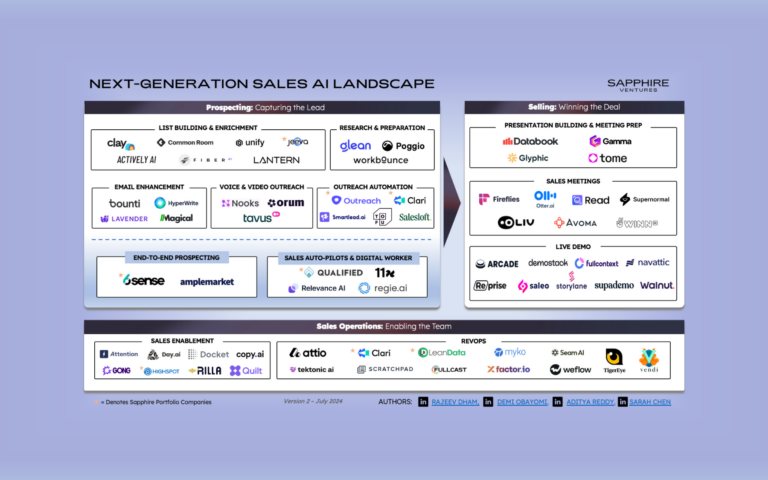The past year saw a rough start for the tech industry, building on an already difficult 2022. Rising inflation, an increase in regulation and continued geopolitical conflicts have contributed to a challenging economic landscape with no immediate resolution. These factors have resulted in a downward spiral for many tech companies and a slowdown in investment pace, particularly among growth- and expansion-stage investors. Layoffs have continued to affect the industry, and much-awaited IPOs, including those of Instacart and ARM, were lackluster.
Amid this grim landscape, GenAI brought a glimmer of hope in 2023, sparking excitement among tech investors and startups. The year saw dozens of investments in early-stage GenAI startups, as well as notable enterprises aggressively entering the GenAI game (e.g., Microsoft’s $10B bet on OpenAI). Since January, GenAI startups raised $18B in corporate and VC investments and now make up 60% of new unicorns. As excitement about the technology’s capacity to ramp up productivity and transform industries reached a fever pitch, so did trepidation about its implications for security and society.

While I expect the tech market to remain static in 2024, I believe we’ll see initial signs of improvement in startup growth and the IPO window toward the later part of the year. We’ll also continue to see excitement around tech innovation. In particular, GenAI will open up new possibilities for creativity, unprecedented productivity growth and unique business models. With this in mind, below are 10 enterprise tech trends I believe will shape the tech sector next year:
1. The hype around GenAI will give way to a focus on results
Over the past year, investors, startups and enterprises alike have been clamoring to jump on the GenAI train so it doesn’t pass them by. In 2024, some of the buzz will dissipate, and growth investors will start focusing on businesses with tangible use cases that have built real revenue through GenAI. Companies truly innovating with the technology will distinguish themselves from the masses of startups that have sprouted up in the space. Success is not about developing applications; companies that solve real problems and engage customers will stand out from the pack– a principle that held true during the explosion of mobile apps
2. GenAI will reduce grunt work and birth truly unique business models
As with any platform shift, it takes time for developers to harness its full potential. GenAI is already reducing the time humans need to spend on tedious tasks, such as responding to customer service queries and writing marketing copy. But to date, companies have primarily incorporated GenAI into existing applications or used it to augment human work. Just as Uber and Doordash came out of the mobile revolution, innovative business models based on GenAI will start to materialize next year, revolutionalizing the future of work with AI.
Many of these business models will be based on reducing grunt work across an array of fields, including healthcare, law and hospitality. Startups will pioneer GenAI assistants for knowledge workers of all stripes, from scriptwriters to business analysts. Of course, the bulk of low-level technical work, such as coding, quality assurance and data analysis, will increasingly be done by GenAI. The technology will fuel new no-code or low-code use cases. For example, tools could emerge that allow people to input conversational text and build entire applications without knowing a coding language. Or an app could determine what users want based on their texts and place online orders for them. The possibilities are endless. Meanwhile, skills that humans excel at — such as specialized knowledge, collaboration, relationship-building and creativity — will become even more important.
3. Misinformation, deepfakes and other cybercrime will escalate
In the coming year, cybersecurity threats will grow more frequent and severe, as criminals become more adept at exploiting advances in AI. One result will be an explosion of false information in the form of fake audio, images and videos. AI will allow misinformation and deepfakes to become even more convincing and spread on a broader scale, eroding public trust and posing challenges for social media platforms, government officials and regulators.
AI will also make cybersecurity more challenging for enterprises. The democratization of software development will enable applications to proliferate. While that could allow innovative ideas to go to market faster, it will also lead to a glut of sub-par applications and introduce new vulnerabilities for cyber attacks. In short, AI will enable existing cybercrimes, from phishing to ransomware to social engineering scams, to reach new heights.
4. AI-enabled tools will address mounting cybersecurity challenges
As cyberthreats grow, businesses of all sizes will be looking for innovative security solutions that allow them to stay one step ahead of hackers. Meanwhile, the industry continues to face a talent shortage of around 3.4 million workers. Advanced AI capabilities will enable cybersecurity teams to step up their defenses while also making headway toward closing the chronic talent gap. Startups will offer solutions that triage alerts based on severity and automate responses to routine concerns, allowing human professionals to monitor more endpoints and respond faster to complex issues.
5. Regulators will step up oversight of AI
In late October, President Biden issued an executive order setting new guidelines for addressing the risks of AI. The order requires companies to engage in “robust, reliable, repeatable and standardized evaluations of AI systems.” That includes establishing standards for “red-teaming” or purposefully trying to prompt bots to produce harmful results. The order also directs the federal government to label AI-generated content to battle fakes and misinformation, supports education and job training to mitigate the impact of AI on workers, and takes measures to protect critical infrastructure.
While it is uncertain how new AI regulations will impact innovation, I’m a firm believer that regulating AI is a good thing overall. Similar to the cybersecurity industry, which operates under a code of conduct and must meet certain regulatory standards, AI should be subject to similar guidelines. Technology can be a powerful tool that can be used to improve lives and harm them at the same time. That being said, with any regulation, the pace of innovation and innovation itself is at risk. But if we learned anything from the Wild West days of tech, it’s better to innovate with regulation in mind than try and catch up, paying hefty fines and upsetting end-users, as has been the case with Facebook, as an example. Even OpenAI is taking proactive steps to enhance its internal safety processes in order to mitigate the risks associated with harmful AI. As a part of this effort, they have established a new “safety advisory group” that will oversee the technical teams and provide recommendations to leadership about the development of AI models.
6. AI-generated creative content will soar to new heights, raising novel questions
GenAI is already authoring books, producing images and making films. Last March, an AI-created photograph won a national competition, and the technology will get better and better at creative pursuits. Will the Grammys or Oscars create new categories for AI-generated works? The expansion of AI-based entertainment will raise new questions about human creativity and our relationship with machines.
It will also raise further quandaries about ownership, an issue that has already come to the fore. In 2023, a number of authors, including George R.R. Martin and Jodi Picoult, sued OpenAI for using their copyrighted works to train generative AI models. Next year, the courts and regulators will begin to figure out how ownership, privacy and credit will work in the generative AI economy.
While AI will dominate the tech sector, here are a few other tech trends I expect in 2024:
7. Defense Tech will have its moment in the spotlight
Primarily driven by the rapidly evolving nature of global security threats, including geopolitical tensions, cyber warfare and the emergence of new domains of conflict, such as space and digital battlegrounds, I expect investments in defense technology to increase in the year ahead. We’ll also see a rise in the integration of AI/ML across various defense systems. These tools and technologies have the power to revolutionize defense strategies by enhancing decision-making, intelligence analysis, logistics and autonomous operations. AI/ML-based solutions specifically will start to be used in the predictive maintenance of military equipment, surveillance operations and even in direct combat roles through unmanned systems like drones and autonomous vehicles. Additionally, cyber defense will continue to be a critical area, with advancements in AI-driven cybersecurity tools to protect against increasingly sophisticated cyber threats.
Space and hypersonic technologies are another investment area in defense technology expected to gain traction. As space becomes the new frontier for defense, we can expect significant investments in satellite technology, space-based surveillance and missile tracking systems. The development of hypersonic weapons, capable of traveling at speeds greater than Mach 5, will likely also be a focus, driving advancements in missile defense systems. These advancements will not only enhance military capabilities but also necessitate new defense strategies and doctrines to address the evolving landscape of warfare technology.
8. Investment activity will increase but remain tempered
With high-profile tech IPOs now trading at low multiples, companies aren’t eager to go public in early 2024, and most won’t risk doing so in the middle of an election cycle. As a result, the IPO window is unlikely to open until 2025. With this in mind, private equity firms and financial sponsors will be making modest strategic acquisitions, but larger deals may be on hold due to concerns about regulatory hurdles. VC activity will step up compared to 2023, but it won’t approach its heyday. With financing tight, more companies are likely to follow in the footsteps of WeWork, facing bankruptcy or going out of business next year.
9. Despite FTX fallout, crypto is here to stay
Despite turbulence in the crypto market over the past two years and fallout from the FTX collapse, cryptocurrency will remain resilient in 2024 and integrate further into the mainstream financial system. Bitcoin has increased over 150% in value in 2023, and Ethereum has gained over 80%. The SEC has approved ETFs linked to bitcoin futures and is expected to greenlight the first spot bitcoin ETFs next year. In 2024, cryptocurrency will further cement its staying power becoming a standard asset class and means of portfolio diversification.
10. VCs will keep investing in quantum computing
Significant venture investments will continue to go to quantum hardware and software. In quantum hardware, the investments will focus on the next generation of quantum processors using various new qubit technologies. In quantum software, investments will fund quantum simulation tools, error correction software, as well as DevOps and middleware software that enable developers to build applications on quantum computers. Additionally, quantum cryptography, particularly post-quantum cryptography and quantum key distribution systems, presents an investment opportunity due to the security implications of quantum computing on current encryption methods.
While 2024 isn’t likely to see massive leaps in investment pace, it does promise to be an incredibly exciting year for advances in the tech industry, driven by GenAI moving into the next inning, adding real value to businesses and consumers alike. We look forward to watching closely and supporting groundbreaking companies as GenAI remakes how we work and live.




